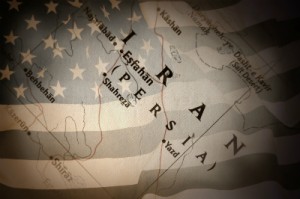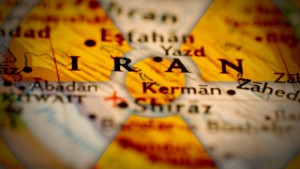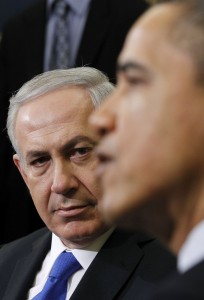This week, Jeffrey Goldberg gave cover to Mitt Romney’s critique of public discussion about the consequences of going to war with Iran in Bloomberg News.
Goldberg wasn’t giving Romney a platform for his messaging; he agrees with the Republican nominee’s assessment:
Romney’s more potent criticism of Obama has more to [...]]]>
 This week, Jeffrey Goldberg gave cover to Mitt Romney’s critique of public discussion about the consequences of going to war with Iran in Bloomberg News.
This week, Jeffrey Goldberg gave cover to Mitt Romney’s critique of public discussion about the consequences of going to war with Iran in Bloomberg News.
Goldberg wasn’t giving Romney a platform for his messaging; he agrees with the Republican nominee’s assessment:
Romney’s more potent criticism of Obama has more to do with statements made by Obama’s underlings. It is true, as Romney wrote, that administration officials have discussed publicly the risks of an American (or Israeli) attack on Iran’s nuclear facilities. There are risks, of course — potentially catastrophic ones — of attacking. But it doesn’t help the American negotiating position to publicly telegraph to the Iranians these sorts of doubts.
Goldberg reiterated his stance in the Atlantic:
President Obama has been undermined from time to time by his own team on the Iran question — whenever a senior official of his administration analyzes publicly the dangers of a military confrontation to the U.S., we should assume the Iranian leaders breathe a sigh of relief, and make the calculations that Obama is bluffing on military action.
Not everyone agrees with Romney and Goldberg, whose flawed reporting about the alleged threat from Saddam Hussein in 2002 was referenced by US hawks to advance their case for war on Iraq. Indeed, prompted by Israel’s latest Iran-pressure campaign, the editorial board of USA Today urged for a real discussion about the military option’s consequences:
But the choice between hot and cold wars is exactly what needs to be discussed before the U.S. risks launching itself into another military morass. Look at the daunting consequences, and you see why Israelis are so divided:
But can the cons of publicly discussing an easily devastating war be more harmful than concealing the discussion from the public? Ali Gharib answers in the Daily Beast:
Were the administration not willing to publicly discuss the potential consequences with its public, then the threats better be a bluff—because to launch this war without a national dialogue would be a monumental disservice to American democracy, not to mention irresponsible. The stakes are simply too high: an eminent group of foreign policy heavyweights recently said an attack could spark an ”all-out regional war“; former top Israeli security officials say strikes could be counterproductive, spurring Iran to build the bomb, and justify it. That’s to say nothing of the incredible potential these scenarios—deemed likely by experts—hold for spilled American blood and treasure.
As does Ben Armbruster in ThinkProgress:
…having a thorough, thoughtful, honest and open discussion about the consequences of going to war with Iran only helps us and our allies. Democracies debate policy openly and freely, which actually could serve as a model for those Iranians looking for change. Openly discussing and knowing the consequences of attacking Iran doesn’t mean that President Obama won’t follow through with his policy of using all options available, including military force, to prevent Iran from acquiring nuclear weapons. It means that he, his administration and the American people will be more informed about what the aftermath of a military attack would look like.
“If we’ve learned anything from the past decade of war in the Middle East, it’s that debates over our national security strengthen our policy and our democracy. Doing the opposite weakens it,” Rubin said.
Indeed, “My belief is we will, in fact, be greeted as liberators” didn’t work out so well in 2003.
]]>
Roger Z. George, a former national intelligence officer who teaches at the National War College in Washington, explains how to avoid making the same mistakes the US made before invading Iraq in 2003, with Iran:
- set extremely high standards for evidence- don’t over-rely on information gathered and supplied by [...]]]>
Roger Z. George, a former national intelligence officer who teaches at the National War College in Washington, explains how to avoid making the same mistakes the US made before invading Iraq in 2003, with Iran:
- - set extremely high standards for evidence
- don’t over-rely on information gathered and supplied by foreign governments
- keep U.S.personnel at arm’s length from policy discussions
- never call on the intelligence community to make the case for intervention, as was the situation in 2003
- have the intelligence community prepare candid assessments of the effect military strikes against Iran’s - nuclear facilities could have on both Iranian politics and regional stability

He concludes:
]]>Needless to say, the decision to attack another Islamic state would carry consequences far beyond reducing Iran’s military potential, and the intelligence community needs to analyze those consequences concurrently with its analysis of intelligence regarding Iran’s nuclear intentions.
These steps will not guarantee that intelligence used to reach the important decisions regarding Iran will be perfect. Clearly, it will not be. However, the intelligence community should not repeat mistakes it made in 2002 and 2003, nor allow itself to become the scapegoat for decisions that properly reside with the nation’s political and military leadership.
Jeffrey Lewis provides a thorough analysis of Benjamin Netanyahu’s graphic aid and theory presented at the 67 UN General Assembly last week and explains why attacking Iran militarily based on the Israeli Prime Minister’s red line is problematic and counterproductive:
…The Prime Minister’s remarks betray a conviction that just [...]]]>
Jeffrey Lewis provides a thorough analysis of Benjamin Netanyahu’s graphic aid and theory presented at the 67 UN General Assembly last week and explains why attacking Iran militarily based on the Israeli Prime Minister’s red line is problematic and counterproductive:
]]>…The Prime Minister’s remarks betray a conviction that just as Iran produced a large amount of UF6 enriched up to 5% before starting to use some of it to make UF6 enriched up to 20%, it will in due course start producing UF6 enriched up to 90%. Bibi’s goal comes down to not to getting salami-slicedto weapons-grade uranium, as Joshua would put it. For that purpose, a line simply needs to be drawn at some distinct and recognizable point.
The liabilities of the Netanyahu theory
So what’s the problem? The short version is that committing to use force prior to an Iranian attempt to make weapons-grade uranium is a very dangerous idea. There’s basically no chance that bombing will stop the Iranian nuclear program. But it might spur Iran to take its bomb program off the back burner, speeding up the weapons timetable. As Joshua put ita couple of years back:
It’s often asserted, with an air of worldy maturity and sobriety, that a resort to arms will only provide a few years’ breathing room…. The truth is closer to the opposite.
Here’s how Jeffrey put it recently:
The benefit of a strike is an induced pause in the program — more or less what we have now[,] though imposed through force. The question is whether an airstrike creates more delay than the current indecision of the Supreme Leader. So far, I think, the best answer has been no…
It’s gratifying to see, in Sunday’s New York Times, that this message is finally starting to creep into broader awareness, a mere five years since the 2007 NIE.
The [...]]]>
 The newly released Iran Project report which I’ve summarized below and which has received widespread coverage in multiple prominent mainstream media publications including the Associated Press, the Wall Street Journal and Haaertz, can be read in full here.
The newly released Iran Project report which I’ve summarized below and which has received widespread coverage in multiple prominent mainstream media publications including the Associated Press, the Wall Street Journal and Haaertz, can be read in full here.
The accompanying letter and list of endorsing bipartisan, high-level national security advisers — all of whom one of the reports’ presenters, Ambassador Thomas R. Pickering noted today “had their say” about the report before publication — can be found in the first pages.
The signatories include Brent Scowcroft, Zbigniew Brzezinski, Richard L. Armitage, Col. Lawrence B. Wilkerson, Chuck Hagel, Gen .Anthony C. Zinni, Leslie H. Gelb, Lee H. Hamilton, Ellen Laipson, Adm. William Fallon, Amb. Thomas R. Pickering, Amb. William Luers, and others. According to the National Security Network, ”Other analysts have recently sounded the same alarm” about the lacking public discussion regarding the benefits and costs of militarily attacking Iran and “While the Iran Project report explicitly does not make policy recommendations, CSIS’s Anthony Cordesman concludes in his recent study, “The best way out is successful negotiations.”
]]>During the weekend Prime Minister Benjamin Netanyahu reiterated his demand that the “international community (read the Obama administration) establish clear “red lines” for Iran’s nuclear program. Then we were told that President Obama was “poised to announce the ‘red lines’ that would trigger a US attack [...]]]>
 During the weekend Prime Minister Benjamin Netanyahu reiterated his demand that the “international community (read the Obama administration) establish clear “red lines” for Iran’s nuclear program. Then we were told that President Obama was “poised to announce the ‘red lines’ that would trigger a US attack on Iran“. Yet speaking with Bloomberg in Russia on September 9, Secretary of State Hillary Clinton not only refused to set a new red line (the current one being Iranian acquisition of a nuclear weapon), she also insisted that the US remains committed to pursuing diplomacy with Iran through sanctions at this time:
During the weekend Prime Minister Benjamin Netanyahu reiterated his demand that the “international community (read the Obama administration) establish clear “red lines” for Iran’s nuclear program. Then we were told that President Obama was “poised to announce the ‘red lines’ that would trigger a US attack on Iran“. Yet speaking with Bloomberg in Russia on September 9, Secretary of State Hillary Clinton not only refused to set a new red line (the current one being Iranian acquisition of a nuclear weapon), she also insisted that the US remains committed to pursuing diplomacy with Iran through sanctions at this time:
]]>QUESTION: On Iran, nuclear negotiations have ground to a halt despite increasing noises out of Israel about a possible preemptive military strike. The EU is now talking about new sanctions. What’s the game-changer here? Does the U.S. need to state more explicit redlines to persuade Iran to take the deal that was offered and to reassure Israel to hold off from a military strike?
SECRETARY CLINTON: Well, I think we’ve maintained a steady course of our two-pronged policy. We have always said every option was on the table, but we believe in the negotiation, the diplomatic effort through the P-5+1, but also pressure. And we are working to increase that pressure. The sanctions, we know, are having an effect. The efforts that the P-5+1 have made to pin Iran down on what exactly they are willing to do are still underway, and we will be having some meetings in the next month in New York and elsewhere to take stock of where we are. So I think it’s a very challenging effort to get them to move in a way that complies with their international obligations, but we believe that is still, by far, the best approach to take at this time.
QUESTION: Is there a deadline?
SECRETARY CLINTON: We’re not setting deadlines. We’re watching very carefully about what they do, because it’s always been more about their actions and their words.
QUESTION: Right. The Israelis, of course, have their own timeline and their own deadlines in their mind. What are the latest that you’re hearing from them privately beyond what’s coming out in the media about their willingness to wait for negotiations to have time to work?
SECRETARY CLINTON: I don’t think that there’s any difference in their public and their private concerns. I mean, they feel that it would be an existential threat if Iran were a nuclear-weaponized state. And no nation can abdicate their self-defense if they feel that they’re facing such a threat.
Our message has been very clear, and the Israelis have supported us through the last three and a half years, that we had to unite the international community, we had to put the most intensive sanctions we could possibly get, both through the international community and then unilateral by the United States, by the Europeans, and others. And they really have recognized, in all of our conversations, that these sanctions are making a difference. They’re more anxious about a quick response because they feel that they’re right in the bull’s eye, so to speak, if this doesn’t end up changing Iranian behavior and their nuclear weapons program. But we’re convinced that we have more time to focus on these sanctions, to do everything we can to bring Iran to a good faith negotiation.
Former congressional aide and diplomat Joel Rubin argues in the Jewish Chronicle that the strike-Iran media bonanza is harming Israel and endangering diplomatic efforts to end Iran’s alleged nuclear ambitions. “When it comes to unilateral military strikes against Iran, it is clear that Israelis are not all on board”, [...]]]>
Former congressional aide and diplomat Joel Rubin argues in the Jewish Chronicle that the strike-Iran media bonanza is harming Israel and endangering diplomatic efforts to end Iran’s alleged nuclear ambitions. “When it comes to unilateral military strikes against Iran, it is clear that Israelis are not all on board”, writes Rubin, and for good reason:
]]>A strike right now would undermine the painstaking work that has taken place these past several years to pressure Iran to give up its nuclear ambitions. Israelis do not want to be opposite the United States on questions of war and peace. And many national security experts believe that military action may even hasten Iranian acquisition of a nuclear weapon.
So let’s remember that as the talk of war mounts, there is another perspective: the pressure on Iran remains, talks are under way, and there is no new evidence demonstrating that Iran is about to acquire nuclear weapons.
Now is the time for productive patience, not military strikes. After all, it’s much easier to start a war than it is to end one.
Michael Ledeen, a neoconservative historian and long-time Iran hawk who joined the hardline Foundation for Defense of Democracies after leaving the American Enterprise Institute in 2008, summarizes Israel’s strategy with the United States and Iran:
…Israel does not want to do it. For as long as I [...]]]>
 Michael Ledeen, a neoconservative historian and long-time Iran hawk who joined the hardline Foundation for Defense of Democracies after leaving the American Enterprise Institute in 2008, summarizes Israel’s strategy with the United States and Iran:
Michael Ledeen, a neoconservative historian and long-time Iran hawk who joined the hardline Foundation for Defense of Democracies after leaving the American Enterprise Institute in 2008, summarizes Israel’s strategy with the United States and Iran:
]]>…Israel does not want to do it. For as long as I can remember, the Israelis have been trying to get U.S. to do it, because they have long believed that Iran was so big that only a big country could successfully take on the mullahs in a direct confrontation. So Israel’s Iran policy has been to convince us to do whatever the Israelis think is best. And while they’re willing to do their part, they are very reluctant to take on the entire burden.
Just read what Israeli leaders are saying and you’ll see that, I think.
But if you’re the prime minister, and your head of military intelligence comes to you and says “time’s up,” and you’ve failed to convince the Americans, then you’ve got to act.
Is that the situation today? I don’t know, and I don’t know if anyone around here — including Petraeus and Panetta — knows. The one thing I do know is that in order to answer the “will they or won’t they?” question, you’ve got to know what the Israelis think they know about the Iranians.
Which you don’t. Nor I. So shut up and stop sucking your thumb.
The 6 August issue of the Wall Street Journal contained a disturbing article on Iran by Israel’s ambassador to the United States, Michael Oren. It was disturbing not because Oren presented reasoned evidence that Iran’s leaders have decided to use their uranium enrichment capacity to produce nuclear weapons (he [...]]]>
 The 6 August issue of the Wall Street Journal contained a disturbing article on Iran by Israel’s ambassador to the United States, Michael Oren. It was disturbing not because Oren presented reasoned evidence that Iran’s leaders have decided to use their uranium enrichment capacity to produce nuclear weapons (he did no such thing) – but because the article amounted to an unreasoned appeal to the post-9/11 sensitivities of American readers to justify a pre-emptive attack on Iran that would contravene Israel’s international obligations.
The 6 August issue of the Wall Street Journal contained a disturbing article on Iran by Israel’s ambassador to the United States, Michael Oren. It was disturbing not because Oren presented reasoned evidence that Iran’s leaders have decided to use their uranium enrichment capacity to produce nuclear weapons (he did no such thing) – but because the article amounted to an unreasoned appeal to the post-9/11 sensitivities of American readers to justify a pre-emptive attack on Iran that would contravene Israel’s international obligations.
Let me try to explain.
The theme of the article is: Iran is the world’s leading terror sponsor without nuclear weapons.With them, it can commit incalculable atrocities.
Is Iran the world’s leading sponsor of terror? Without access to reams of intelligence this is hard to judge. Iran is undoubtedly a sponsor of terror, but bestowing on it the number one spot probably requires making assumptions about Hezbollah and about what constitutes “sponsorship” that are contentious.
Oren alleges that Iran has “supplied 70,000 rockets to terrorist organisations deployed on Israel’s border”. But Israel is one of only six United Nations members (out of 192), the US being another, that classify Hezbollah as a terrorist organisation. Hezbollah’s paramilitary wing is seen as a resistance movement in most Muslim countries. Hezbollah was born in response to the 1982 Israeli invasion of Lebanon, which prompted the UN Security Council to express grave concern at the violation of the territorial integrity, independence, and sovereignty of Lebanon.
Oren affirms that “Iranian-backed Hezbollah terrorists” killed five Israeli tourists in Bulgaria in July, echoing a claim made by Israel’s Prime Minister within half an hour of this outrage occurring. But to date neither the Bulgarian authorities nor, reportedly, the CIA, share Israeli certainty that Iran can reasonably be accused of this barbarous act.
The most dangerous terrorist network of the last decade is generally held to have been Al Qaeda. Iranian support for an Al Qaeda operation in Saudi Arabia has been alleged but not proved. No authoritative source has ever linked Iran to the 9/11 tragedy. Al Qaeda’s leaders are Sunni extremists, Iran’s are Shiite Muslims; the twain meet reluctantly.
So what sounds like a statement of fact – “Iran is the world’s leading sponsor of terror” – is in reality a subjective evaluation. Now what of the claim that with nuclear weapons Iran “can commit incalculable atrocities anywhere in the world”?
The first thing to notice is the auxiliary verb: “can”. There are many states (including Israel) that have the capacity to do the most terrible things to other states. Mankind has survived until now, however, because capacity is only half the story: the will to use that capacity for offensive purposes also needs to exist.
Oren tries to cope with that fact by reminding readers of the “genocidal rhetoric” to which Iran’s leaders are prone. What he fails to mention is that this rhetoric may not be a reliable guide to Iranian intentions and that for thirteen years (1979-1992) Israel’s leaders were happy to assume it wasn’t.
In truth, leading Iranians have been threatening Israel for more than 30 years, but have yet to act. Hezbollah’s 1985 manifesto talks of the “final obliteration” of Israel; but Hezbollah has shown no sign of wanting to use its “70,000 rockets” not in self defence but to bring about that obliteration. At any point in the last 30 years Iran could have supplied Hezbollah with radioactive material for use in “dirty bombs” or with infectious pathogens for dispersal among the Israeli population. Yet, there is no indication that Iran has tried to do so.
Let us suppose, however, that Iran somehow contrives to produce a score of nuclear weapons without the UN Security Council acting to avert such a gross violation of Iran’s Nuclear Non-Proliferation Treaty (NPT) obligations. Would that enable Iran to “commit incalculable atrocities anywhere in the world”?
Of course not. Iran does not possess an intercontinental ballistic missile capability. Iran’s leaders, who are “rational actors” in the view of US intelligence and defence experts, know that an Iranian first use of nuclear weapons would invite the annihilation of their goods and chattels in a nuclear counter-strike. Possession of nuclear weapons does not secure immunity from punishment for outrages committed by terrorist proxies. Nuclear forensic science provides a persuasive deterrent against making nuclear weapons available to terrorist proxies.
So the highly emotive claim that the possession of nuclear weapons would enable Iran to commit atrocities wherever it chooses turns out to be without a solid foundation in reason.
Oren’s article is also remarkable for a number of distortions of the truth, to put it politely. Since 1992, Iran’s leaders have not “systematically lied about their nuclear operations”. They have not “blocked International Atomic Energy Agency (IAEA) inspectors from visiting Iran’s nuclear sites”. They have not “rejected all confidence-building measures”. Iran’s centrifuges are not “spinning even faster” today than in the past. And “with each passing day”, the lives of eight million Israelis are not “growing increasingly imperilled”.
Last, Oren suggests that the President of the United States can bestow on Israel a right of self-defence “against any threat” at a time of its choosing. This is not so. Israel’s right of self-defence flows from and is circumscribed by Article 51 of the UN Charter, since Israel is a party to that Charter.
Article 51 recognises a right of self-defence “if an armed attack occurs against a Member of the United Nations”. Since the Charter was agreed, UN members have come to accept that the clear imminence of an armed attack might also justify acts of self-defence. But it is unlikely that the UN membership, or the Security Council where responsibility for maintaining and restoring peace and security rests, would regard the acquisition of a uranium enrichment capacity by a neighbouring state, even one suspected of having conducted research into the design of nuclear weapons, as amounting to an imminent armed attack.
However, these observations are incidental to my main points: the claim that Iran is “the world’s leading terror sponsor” is subjective and possibly an exaggeration; and, it is highly questionable whether possession of nuclear weapons would lead Iran to commit “incalculable atrocities”. Iran has been responsible for acts of terror since shortly after the founding of the Islamic Republic, but that is not the reason why most members of the international community object to Iran’s attempts to acquire nuclear weapons, or why they welcome the continuing absence of evidence proving nuclear weapons production.
I leave readers to form their own conclusions as to why Israel’s ambassador to the United States seeks to appeal to the emotions and not the reason of the American public, and why he finds it necessary to give an inaccurate account of certain facts.
]]>In an interview with Al-Monitor‘s Laura Rozen, the Obama Administration’s former top Pentagon mideast advisor, Colin Kahl, explains why he isn’t writing off Israel’s latest threats about Iran from key Israeli decision-makers Benjamin Netanyahu and Ehud Barak as mere saber-rattling:
Al-Monitor: Why are the arguments that it is [...]]]>
 In an interview with Al-Monitor‘s Laura Rozen, the Obama Administration’s former top Pentagon mideast advisor, Colin Kahl, explains why he isn’t writing off Israel’s latest threats about Iran from key Israeli decision-makers Benjamin Netanyahu and Ehud Barak as mere saber-rattling:
In an interview with Al-Monitor‘s Laura Rozen, the Obama Administration’s former top Pentagon mideast advisor, Colin Kahl, explains why he isn’t writing off Israel’s latest threats about Iran from key Israeli decision-makers Benjamin Netanyahu and Ehud Barak as mere saber-rattling:
Al-Monitor: Why are the arguments that it is not just saber-rattling more compelling?
Kahl: First, US and European sanctions have nearly maxed out. So what additional benefit does the saber-rattling produce here? Second, the P5+1 process is on hold for the moment and a major breakthrough on the accelerated timeline envisioned by the Israelis is unlikely. Not to mention the fact that some Israeli decision- makers seem skeptical of the benefits of diplomacy, period. Third, despite the saber-rattling, the Iranians don’t fear an Israeli strike (although they might fear a US strike). So Tehran isn’t likely to make a concession in the near-term just because of an Israeli threat.
Finally, the Israelis would seem to know that the prospect of a US strike before the [November 6 US presidential] election is very low, regardless of their posture. This is not primarily for political reasons, as some suggest, but because Iran is not likely to cross US red lines this year. So the prospect of an Israeli attack is unlikely to drive Obama to war before November.
So, I think it is more likely Israeli leaders are preparing the Israeli public for a strike, and creating a narrative for the international community that diplomacy and sanctions have failed and thus Israel has no choice.
Kahl, a Georgetown Professor who is advising the Obama campaign’s foreign policy team, summarized his position about using the “military option” on Iran this June in a report he co-authored for the Washington-based think tank, the Center for a New American Security (CNAS):
A nuclear-armed Iran would pose a significant challenge to U.S. and Israeli interests and would increase the prospects for regional conflict. Nevertheless, a preventive military strike against Iran’s nuclear program by either the United States or Israel at this time is not the best option, and rushing to war would risk making the threat worse.
“Although Israel’s leaders frequently lament all the Iran ‘chitchat,’ make no mistake: It’s they who are fueling the discussion,” the Associated Press notes in a report on “Israel plunged into unprecedented debate on Iran war.”
The United States’ “red line” on Iran (an Iranian nuclear weapon), which differs from Israel’s “red line” (Iranian nuclear weapon capability), is one reason why the U.S. remains reluctant to give in to the Israeli pressure campaign. From the CNAS report:
Until Iran appears poised to weaponize its nuclear capability, however, the preferable option is to continue the current combination of pressure and diplomacy. All options, including preventive military action, should remain on the table, but policymakers should recognize that the potential risks and costs associated with using force are high. Military action should remain a last resort, which should be contemplated only by the United States and only under stringent conditions.
Kahl tells Rozen that the two Israeli leaders are convinced that they have to rely on themselves when it comes to dealing with Iran — another Israeli-pushed narrative that’s being reinforced by U.S.-based Israel advocates like Jennifer Rubin — and while that may be the juiciest part of the interview, the following stood out for me (emphasis mine):
]]>Al-Monitor: It’s worth noting these arguments are being made primarily in the Israeli media, as opposed to the international media — The New York Times, CNN, etc. as in the past. This is an argument being made to the Israeli public.
Kahl: It’s very interesting… One explanation may be that it is an intentional effort to condition the Israeli public. Israel appears to be going through the Iraq dynamic we in the United States went through in 2002-2003 [ahead of the March 2003 US invasion of Iraq]. And as Time’s Tony Karon noted the other day, there are only so many times you can tell the Israeli public that they face a “grave and gathering threat of annihilation” before Israeli politicians, for the sake of their credibility at home and abroad, have no choice but to act.
via the Federation of American Scientists
I have been less than a week in the medium-sized city of Neishabour, Iran, visiting relatives, and I can see no sign of a country hunkering for intensifying sanctions and looming difficult times. Sidewalks are full of shoppers and people seem to go [...]]]>
via the Federation of American Scientists
 I have been less than a week in the medium-sized city of Neishabour, Iran, visiting relatives, and I can see no sign of a country hunkering for intensifying sanctions and looming difficult times. Sidewalks are full of shoppers and people seem to go about their business as usual. People are complaining about rising prices but they keep buying. There are extravagant wedding parties every evening as hopeful couples tie the knot before the holy month of Ramazan starts, on Friday July 20. Looking at the pace of normal life, one can understand why Iranian leaders seem in no hurry to throw in the towel in the nuclear standoff with the West, and why Western claims of imminent economic doom are exaggerated.
I have been less than a week in the medium-sized city of Neishabour, Iran, visiting relatives, and I can see no sign of a country hunkering for intensifying sanctions and looming difficult times. Sidewalks are full of shoppers and people seem to go about their business as usual. People are complaining about rising prices but they keep buying. There are extravagant wedding parties every evening as hopeful couples tie the knot before the holy month of Ramazan starts, on Friday July 20. Looking at the pace of normal life, one can understand why Iranian leaders seem in no hurry to throw in the towel in the nuclear standoff with the West, and why Western claims of imminent economic doom are exaggerated.
But all is not well, not by a long shot. The dollar has gone through the roof, food prices have skyrocketed, industrial production is down, and unemployment is rising. The oil embargo has cut into Iran’s oil revenues and financial sanctions have limited the country’s access to the global economy. Spot shortages and sharp price increases for key food items are already being felt across Iran. This provincial city was rocked on July 23 when hundreds marched down its main street protesting the shortage of chicken at the official price. There is no doubt that ordinary Iranians will pay a heavy price as sanctions intensify; the big question is how sanctions will influence Iran’s behavior in the international stage.
When sanctions were “smart” and aimed to make life difficult for Iran’s leaders, ordinary Iranians acted as disinterested bystanders. But now that sanctions aim to make life difficult for them, they will have to take sides. Or so goes the theory: put pressure on the people — “economic warfare,” as one conservative commentator told the New York Times — so they get their government to compromise.
Since this theory is about to be put to an extremely costly test, it is important to consider a few things before we commit to this path.
First, international sanctions only work when the population they are imposed on identifies with the objective of the sanctions. This is the big difference between the sanctions to end apartheid in South Africa and those to force Iran to abandon nuclear enrichment. Most Iranians are not all that invested in nuclear enrichment, one way or the other, but few would see stopping Iran’s enrichment as their cause.
Furthermore, history shows that, when threatened by sanctions, Iranians are unlikely to rise up against their own government. In 1952, a Western-imposed embargo on Iranian oil devastated Iran’s economy, but people tolerated the pain and stood with their government. It took a US-sponsored coup a year and a half later to topple the nationalist government and help Western powers achieve their objectives.
True, Iranians are more polarized today, especially after the rise of the Green movement following the controversial election of 2009. But it is a misreading of Iran’s political scene to believe that sanctions will revise or strengthen the protest movement. The opposite may be true. The Green movement was built on economic growth and an expanding middle class. Thanks to economic growth fueled by rising oil revenues, 40percent of Iranians have joined the middle class and the lower 40 percent aspire to the same. The economy has not been doing well lately, the average Iranian still enjoys a decent standard of living, has access to basic services, health, and education. Significantly, last year’s Human Development Report that ranks countries based on income, health, and education placed Iran above Turkey, which is the best performing country in the region.
Sanctions are slowly transforming Iran from a country with an expanding middle class and a rising private sector into a country with a shrinking middle class and private sector. Financial sanctions have placed private firms at a disadvantage relative to government-owned firms in making global transactions. Where the private sector withdraws, the state is often ready to move in.
More severe sanctions will go beyond hurting the private sector and threaten the living standards of the middle class. As basic services deteriorate, and the shortages and long lines that were common sights during the Iran-Iraq war reappear, the government will once again become not the source but the remedy to their problems.
The sanctions will do much to undermine the belief among Iranians about the benefits of the global economy. Such beliefs are what distinguish India from Pakistan. If there is hope for Egypt and Tunisia after the Arab Spring to become stable societies it is the belief in the benefits to their citizens of remaining connected to the global economy. The short-term gains from nuclear gamesmanship must balance the long-term cost of alienating the Iranian middle class.
Spreading faith in global cooperation used to be the White Man’s Burden, but no longer. Leaders in Brazil, China, India and Turkey have done a lot to persuade their people that working within the global economy is not a threat but an opportunity. Many leaders of the Islamic Republic have pushed a similar view. The year President Ahmadinejad took office, in 2005, the Fourth Development Plan he inherited was subtitled “In Conformity with the Global Economy.” These leaders believed in the Islamic Republic as a development state. They built infrastructure and schools and promoted family planning. Naturally, they do not want to gamble all they have achieved in a high stakes nuclear game. If by chance they are contemplating to revive the Islamic Republic as a development state, the world should help them succeed, not undermine their effort.
]]>